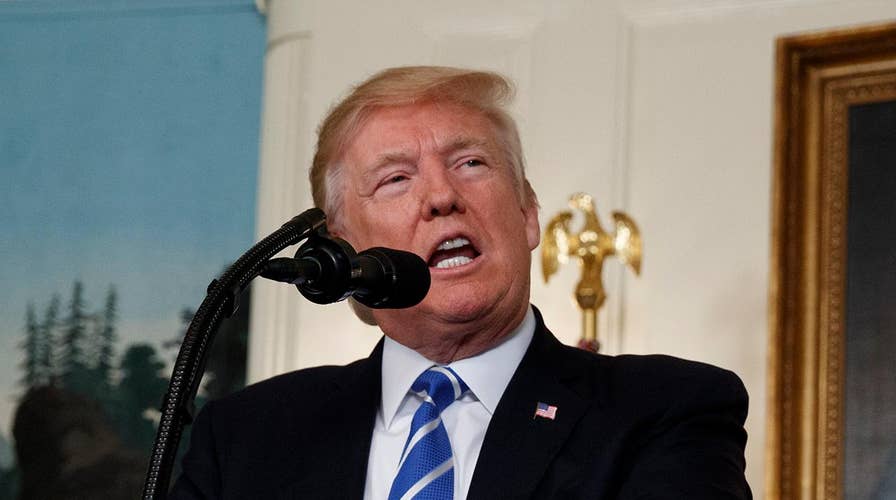President Trump recaps highlights from Asia trip
President Donald Trump says his trip to Asia showed that America's 'standing in the world has never been stronger.'
Not since Marco Polo has a Westerner been received in Asia with such fanfare and respect as Donald J. Trump, according to President Donald J. Trump.
In an infomercial and trip report masquerading as a press conference Wednesday afternoon, President Trump continued his orgy of self-congratulation, pronouncing his 12-day trip to five Asian nations a diplomatic and economic triumph or – as he called it before leaving his last stop – “epic.”
“America is back,” the president said, drawing his own bottom line on the results of his tour of the newly coined Indo-Pacific, his longest foreign trip to date.
Analysts disagreed sharply about the president’s performance and alleged accomplishments. Critics like Max Boot denounced President Trump for “ceding power to China and undercutting the values that America has long championed,” such as respect for the rule of law and human rights.
Boot complained on the Foreign Policy website that the trip should have been labeled the “Farewell Tour” – “farewell to American power, farewell to American ideals, and farewell to American credibility.”
By contrast, Trump defender John Bolton, a former United Nations ambassador and undersecretary of state in the George W. Bush administration, said that President Trump had made “important progress against North Korea’s nuclear weapons and ballistic missile programs.” But even Bolton acknowledged it remains unclear whether China would really squeeze Pyongyang.
Having visited South Korea shortly before President Trump’s trip, I found the results of the president’s tour mixed.
In President Trump’s defense, his official abandonment of President Obama’s “strategic patience” towards North Korea’s ambitious nuclear program was welcome at home and in Asia.
President Trump also had a smooth meeting with South Korean President Moon Jae-in. Tensions between the two presidents had been strained, given President Trump’s earlier criticism of the South Korean leader’s initial desire to rekindle ties with North Korea, a new iteration of Seoul’s failed “Sunshine Policy.”
President Trump used his stops in Tokyo and Seoul – in particular his speech to South Korea’s National Assembly – to reassure South Korea and America’s other Asian allies that Washington remains committed to their security.
Thomas Byrne, president of the Korea Society, said that President Trump’s “portrait of the political and economic achievements of South Korea’s modern history” had won “hearts and minds across the aisle.”
Even Susan Rice, President Obama’s former national security adviser, said that President Trump had delivered “solid performances” in Tokyo and Seoul.
But the trip seemed to go downhill from there. The president’s “kowtowing” to China, as Rice put it, “sent chills down the spine” of Asia experts and U.S. allies “who have relied on the U.S. to balance and sometimes counter an increasingly assertive China.”
On the trade front, President Trump did not walk away with concrete bilateral agreements. The 11 other nations that have agreed to the Trans Pacific Partnership trade agreement, which President Trump rejected, decided to proceed without the U.S.
Moreover, little seemed new in the achievements President Trump mentioned.
Everyone who followed his trip through news reports had already heard about the more than $300 billion of trade deals and Asian purchases of American products and services. They already knew that many of the investment agreements were non-binding and that some of the allegedly new deals were well under way before President Trump took office.
TV news viewers had already seen President Trump’s red-carpet welcome at three state dinners. We had already watched the president smile during human rights violator Philippine President Rodrigo Duterte’s cringe-worthy crooning.
And finally, we had seen President Trump appear to side yet again with Russian President Vladimir Putin rather than the U.S. intelligence community. President Trump soon had to walk back the inference that he believed Putin’s denials of Russian meddling in the 2016 presidential election.
Oddly, President Trump made no mention of the Chinese delegation that will soon head for North Korea for talks with its nuclear-armed problem child – the highest-ranking Chinese delegation to visit Pyongyang in years.
Nor did President Trump mention another concrete achievement – bringing home from China three American college basketball players who were arrested on shoplifting charges.
Perhaps President Trump did not consider either achievement impressive enough to tout. Or perhaps something he had planned to unveil turned out to be not yet ready for prime time, leaving him short of tangible results.
It may take weeks to learn what happened at meetings with the leaders who President Trump saw behind closed doors. Secretary of State Rex Tillerson and other aides suggested the president was tougher in those private sessions, but who knows?
Given President Trump’s record to date, his avoidance of a diplomatic disaster may have been sufficient to be considered praiseworthy. But whatever the cause, the president’s press conference – complete with a Marco Rubio water bottle sipping moment – seemed oddly disconnected with the Washington narrative that he is usually so adept at setting.
President Trump was out of synch with a capital obsessed about whether Alabama Republican U.S. Senate candidate Roy Moore, who has been accused of sexual misconduct with teenage girls, would withdraw from the race. Uncharacteristically, the president took no questions and did not respond to shouted questions about whether Moore should quit.
The White House had teased the press Tuesday with promises of a major announcement about President Trump’s Asia trip. Would he levy new tariffs on China? Would he put North Korea on the nation’s list of terrorist-sponsoring nations? Would he unveil a set of new trading agreements with key Asian partners?
But Wednesday’s appearance fell flat. As it turned out, the hint of huge news was, well, fake news.









































